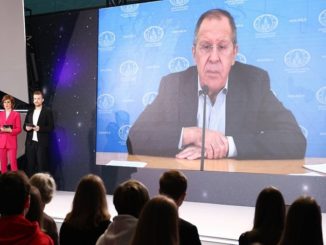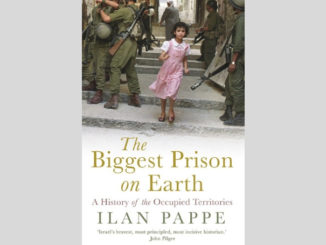
By Sean Clinton
Something is seriously amiss when one of the world’s leading human rights organizations publishes a major report about human rights in the jewelry supply chain and fails to spotlight gross human rights violations by Israel – the biggest net beneficiary of the global diamond industry.
Compounding this inexcusable omission, a global forum on responsible mineral supply chains at the Organization for Economic Cooperation and Development (OECD) in Paris days after Israel, an OECD member, massacred over 30 unarmed civilians in Gaza didn’t merit a whisper let alone outrage from any of the esteemed delegates present.
The latest Human Rights Watch report about the jewelry industry, The Hidden Cost Of Jewellery, exposes some of the human rights failures which continue to haunt the industry. But despite claiming to scrutinize the supply chains of thirteen major jewelry brands the scrutiny ends abruptly at the mine gate and ignores the myriad of grievous human rights violations funded by revenue from the Israeli diamond industry further along the supply chain.
If these diamonds were funding similar human rights violations in Africa, Iran, North Korea or Syria there would be an international outcry. They would be considered blood diamonds and banned.
HRW’s double standard and blinkered assessment are dangerous and damaging.
It facilitates a multibillion-dollar fraud by which jewelers deceive consumers with diamonds processed in Israel that generate an estimated $1 billion per year in revenue used to fund war crimes, crimes against humanity, apartheid and unregulated nuclear weapons while blinding the public with false claims about “responsible sourcing”.
Furthermore, it bolsters Israel’s belief that it can continue to brutalize, subjugate and kill Palestinians at will without the public making the connection to the diamond trade and damaging its most important manufacturing export industry.
And it hinders efforts to end the trade in all blood diamonds as it perpetuates the false belief that the only blood diamonds are rough diamonds used by rebels and the cut and polished diamonds seen in glossy pages of fashion magazines, on the catwalks and at red carpet events are the ones that do good and won’t be forever on your conscience.
This is not a case of omission due to ignorance.
HRW has published numerous reports detailing serious human rights violations by Israeli forces, most recently in response to Israel’s latest massacre in Gaza when 30 unarmed Palestinians were assassinated in cold blood and thousands more were injured by live ammunition.
Videos showing the gunning down of innocent civilians vividly exemplify the extent of Israel’s impunity-fuelled hubris.
For over a decade HRW has researched and reported on human rights issues linked to the jewelry industry and, therefore, must be aware of Israel’s leading role in the global diamond supply chain. But anyone reading their latest report would have no idea that 20% of the diamonds sold worldwide in value terms are a significant source of funding for a regime HRW accuses of war crimes and crimes against humanity.
This double standard by a preeminent western NGO, and others including Amnesty International, Global Witness, and Impact who co-signed the report, feeds into the belief of many people that the system of international law and order is stacked against poorer nations. Rightly or wrongly, many in the Third World believe it is used as a tool of Western imperial powers to control and bring to heel the leaders of countries they deem no longer serve their interests while those that do literally get away with murder.
HRW agrees that the assessment of all human rights risks throughout the supply chain is critical for “responsible sourcing”. The United Nations Guiding Principles on Business and Human Rights and the OECD “Due Diligence Guidance for Responsible Supply Chains of Minerals from Conflict-Affected and High-Risk Areas” are cited in this regard.
These international standards outline the responsibility of businesses to identify, prevent, mitigate, and account for human rights impacts they cause or to which they contribute throughout their supply chains, not just in the mining sector.
“High-Risk Areas” include areas of political instability, repression, institutional weakness, insecurity, the collapse of infrastructure, widespread violence, violations of national or international law, or other risks of harm to people.
Israel is a conflict and high-risk area, a fact confirmed by the state when defending the army’s actions in Gaza during recent high court proceedings. Companies sourcing diamonds from Israel should account for the human rights impacts funded by the Israeli diamond industry. None of the companies assesses by HRW have done so.
The OECD 12th Forum on Responsible Mineral Supply Chains in Paris 17-20 April, days after Israel killed 30 unarmed civilians in Gaza, should have addressed the blatant example of diamond-funded human rights violations, by a member state.
I asked, via Twitter and email, a number of the delegates including representatives from Amnesty International, Global Witness, Impact Transform, the OECD, and the EU chair of the Kimberley Process 2018, Hilde Hardeman, if they had raised the killing of civilians in Gaza. Only Global Witness responded. They hadn’t raised it and neither had anyone else.
The NGO’s who are supposed to be leading the civil society effort to combat the trade in blood diamonds didn’t consider the killing and injuring of thousands of Palestinian civilians, by an OECD member and a major player in the global diamond trade, merited airing at the foremost international gathering of experts on responsible mineral supply chains.
Who then can we rely on to ensure the ethical provenance of the jewelry consumers spend over $80 billion on each year?
Does anyone seriously expect David Boufford, Vice President, Signet Corporate Affairs, the world’s leading jewelry retailer and a major buyer of diamonds from Israel, who was a panelist during the session “Drivers and Barriers to Responsible Sourcing” to raise the issue of Israel’s diamond-funded human rights violations?
Banning rubies linked to serious human rights violations by the Myanmar military looks good in Signet’s 2017 CSR Report but when much of your profits come from Israeli diamonds it takes strong leadership to act, which Signet clearly hasn’t got.
Or would Carrie George, Director of Responsible Sourcing at Brilliant Earth which also profits from the trade in diamonds cut and polished in Israel, who spoke on the session “Diamonds – Looking Ahead”, be the one to say time’s up for the trade in cut and polished blood diamonds that fund grievous human rights violations by Israeli forces?
Would Stephen Fischler, Chairman of the World Diamond Council, which promotes the bogus System of Warranties that allows jewellers claim diamonds that fund grievous human rights violations by government forces are conflict-free, be the one to call out the hypocrisy which allows Israel to use revenue from the diamond industry to murder, maim and subjugate Palestinians?
And therein lays the crux of the blood diamond impasse. The cosy cartel of actors working to end the trade in blood diamonds includes many vested interests that have much to gain from Israel’s blood drenched diamond trade.
Speaking out against the Israeli diamond industry is utterly beyond the pale in such snug gatherings.
Amnesty International has called for an arms embargo against Israel in response to the killings in Gaza but it will need the support of the US and EU to have any meaningful impact. A far more potent action would be for AI and others to call on consumers and the jewellery industry to reject diamonds processed in Israel – a major source of funding for the regime.
The failure to scrutinise human rights impacts downstream of the mining sector renders meaningless the “Responsible Sourcing” rankings HRW attributed to the thirteen jewellers they assessed.
The company awarded the highest ranking was Tiffany and Co which was given a “strong” rating despite the fact that since 2011 they sourced rough diamonds from a Beny Steinmetz Group (BSG) company, Octea, in Koidu, Sierra Leone.
Tiffany’s relationship with Steinmetz was the subject of a number of articles published in December 2015 and January 2016 revealing links to Israeli human rights violations. An open letter to Tiffany’s chairman, CEO, chief sustainability officer, and corporate social responsibility committee spelled out the risk to the company’s brand and reputation.
In March 2017 Tiffany’s terminated the supply agreement and divested from the Steinmetz Group at a loss of over $40 million.
HRW accepted the limp explanation for the divestment offered by Anisa Kamadoli Costa, Tiffany’s chief sustainability officer, citing a report about community dissatisfaction with the resettlement of residents; the police killing of four protestors years earlier, local frustration because the mine’s benefits have fallen significantly short of expectations and suspected corruption by another Steinmetz company in Guinea.
Tiffany’s claimed the high moral ground when shunning diamonds from Angola, the Democratic Republic of Congo and Zimbabwe over alleged human rights violations but their divestment form Steinmetz, a major supplier, was quietly buried in their SEC filings with no other public statement as of April 2017.
Tiffany’s sudden withdrawal from the Responsible Business Summit USA 2016 and the abrupt dismissal of their new CEO in February 2017 might lead many to believe sourcing diamonds from a company that funds and supports suspected Israeli war criminals is a more plausible explanation for the divestment.
Despite moralizing about the need for openness and transparency Tiffany’s conceal the names of companies from which they source 25-35% of their cut and polished diamonds. Given that 40% of the diamonds sold in the US in value terms are processed in Israel Tiffany may well be sourcing diamonds in Israel where the industry directly and indirectly funds the Israeli military and is notorious for discrimination against Palestinians who make up 20% of the population. If they are it would be a clear violation of Tiffany’s Supplier Code of Conduct.
Other companies that source polished diamonds from Israel, including Signet, Harry Winston and Bulgari, weren’t asked about their supply chains downstream of mining. As a result, this artery continues to flood the market with blood diamonds and the public are given false and misleading information about the ethical credentials of the jewellery industry.
The HRW report does, however, highlight the inadequacy of existing controls employed by the jewellery industry to prevent the trade in some blood diamonds. As I have pointed out previously, the Kimberley Process, System of Warranties and Responsible Jewellery Council Codes of Practices are part of a matrix of deception used by the industry to con consumers while laundering blood diamonds worth billions of dollars each year.
The Kimberley Process is a voluntary system of self regulations agreed to by over 80 governments, many with a vested interest in the diamond industry. The EU chairs the KP in 2018 and as such could use the opportunity to focus attention on human rights violations funded by the supply chain downstream of the mining sector.
As long as vested interests remain deeply embedded with the international bodies responsible for setting the standards and civil society watchdogs turn a blind eye to Israel’s diamond-funded hegemony there is unlikely to be meaningful change.
Civil society groups and shareholders need to put pressure on public companies and governments to end the trade in all blood diamonds at every step of the supply chain and not just in the mining sector.
As the EU chair of the Kimberley Process, Hilde Hardeman, prepares for an intercessional meeting in Antwerp June 18-21 she should be mindful of her obligation to EU citizens to uphold the human rights standards by which we are frequently told the EU is guided. In this regard, the human rights obligations of the non-member state, Israel, need to be enforced in accordance with Article 2 of the Euromed Agreement from which Israel enjoys significant benefits and exports large amount of diamonds to the EU.
– Sean Clinton is a human rights activist from Ireland. He has written numerous articles critical of the double standard in the global jewelry industry which facilitates the trade in diamonds that are a major source of funding for rogue regimes guilty of grievous human rights violations. He contributed this article to PalestineChronicle.com







